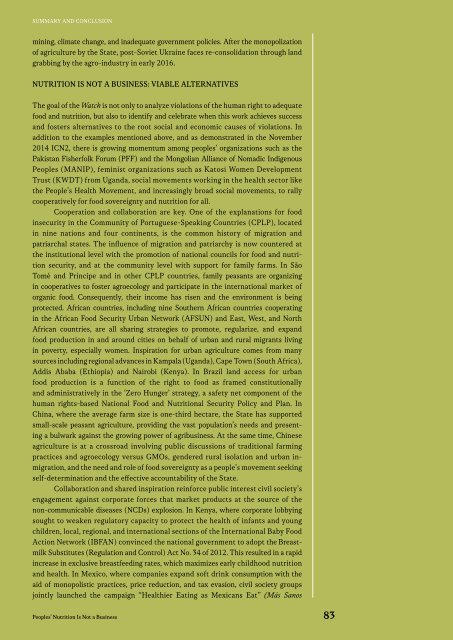RIGHT TO FOOD AND NUTRITION WATCH
1iNBHTY
1iNBHTY
You also want an ePaper? Increase the reach of your titles
YUMPU automatically turns print PDFs into web optimized ePapers that Google loves.
SUMMARY <strong>AND</strong> CONCLUSION<br />
mining, climate change, and inadequate government policies. After the monopolization<br />
of agriculture by the State, post-Soviet Ukraine faces re-consolidation through land<br />
grabbing by the agro-industry in early 2016.<br />
<strong>NUTRITION</strong> IS NOT A BUSINESS: VIABLE ALTERNATIVES<br />
The goal of the Watch is not only to analyze violations of the human right to adequate<br />
food and nutrition, but also to identify and celebrate when this work achieves success<br />
and fosters alternatives to the root social and economic causes of violations. In<br />
addition to the examples mentioned above, and as demonstrated in the November<br />
2014 ICN2, there is growing momentum among peoples’ organizations such as the<br />
Pakistan Fisherfolk Forum (PFF) and the Mongolian Alliance of Nomadic Indi genous<br />
Peoples (MANIP), feminist organizations such as Katosi Women Development<br />
Trust (KWDT) from Uganda, social movements working in the health sector like<br />
the People’s Health Movement, and increasingly broad social movements, to rally<br />
cooperatively for food sovereignty and nutrition for all.<br />
Cooperation and collaboration are key. One of the explanations for food<br />
insecurity in the Community of Portuguese-Speaking Countries (CPLP), located<br />
in nine nations and four continents, is the common history of migration and<br />
patriarchal states. The influence of migration and patriarchy is now countered at<br />
the institutional level with the promotion of national councils for food and nutrition<br />
security, and at the community level with support for family farms. In São<br />
Tomé and Príncipe and in other CPLP countries, family peasants are organizing<br />
in cooperatives to foster agroecology and participate in the international market of<br />
organic food. Consequently, their income has risen and the environment is being<br />
protected. African countries, including nine Southern African countries cooperating<br />
in the African Food Security Urban Network (AFSUN) and East, West, and North<br />
African countries, are all sharing strategies to promote, regularize, and expand<br />
food production in and around cities on behalf of urban and rural migrants living<br />
in poverty, especially women. Inspiration for urban agriculture comes from many<br />
sources including regional advances in Kampala (Uganda), Cape Town (South Africa),<br />
Addis Ababa (Ethiopia) and Nairobi (Kenya). In Brazil land access for urban<br />
food production is a function of the right to food as framed constitutionally<br />
and administratively in the ‘Zero Hunger’ strategy, a safety net component of the<br />
human rights-based National Food and Nutritional Security Policy and Plan. In<br />
China, where the average farm size is one-third hectare, the State has supported<br />
small-scale peasant agriculture, providing the vast population’s needs and presenting<br />
a bulwark against the growing power of agribusiness. At the same time, Chinese<br />
agriculture is at a crossroad involving public discussions of traditional farming<br />
practices and agroecology versus GMOs, gendered rural isolation and urban inmigration,<br />
and the need and role of food sovereignty as a people’s movement seeking<br />
self-determination and the effective accountability of the State.<br />
Collaboration and shared inspiration reinforce public interest civil society’s<br />
engagement against corporate forces that market products at the source of the<br />
non-communicable diseases (NCDs) explosion. In Kenya, where corporate lobbying<br />
sought to weaken regulatory capacity to protect the health of infants and young<br />
children, local, regional, and international sections of the International Baby Food<br />
Action Network (IBFAN) convinced the national government to adopt the Breastmilk<br />
Substitutes (Regulation and Control) Act No. 34 of 2012. This resulted in a rapid<br />
increase in exclusive breastfeeding rates, which maximizes early childhood nutrition<br />
and health. In Mexico, where companies expand soft drink consumption with the<br />
aid of monopolistic practices, price reduction, and tax evasion, civil society groups<br />
jointly launched the campaign “Healthier Eating as Mexicans Eat” (Más Sanos<br />
Peoples’ Nutrition Is Not a Business 83


